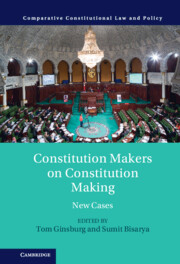Book contents
- Constitution Makers on Constitution Making
- Comparative Constitutional Law and Policy
- Constitution Makers on Constitution Making
- Copyright page
- Contents
- Contributors
- Acknowledgments
- 1 Introduction
- 2 Making and Remaking Kenya’s Constitution
- 3 Kosovo’s Independence Constitution
- 4 Decisions, Deadlocks and Deadlines in Making South Africa’s Constitution
- 5 Makers of Our Own History
- 6 Nepal’s Constitutional Development and the Challenges of Constitution Making
- 7 The Constituent Process in Ecuador
- 8 Burundi
- References
3 - Kosovo’s Independence Constitution
A Unilateral Commitment to an Internationalized Pouvoir Constituant
Published online by Cambridge University Press: 03 November 2022
- Constitution Makers on Constitution Making
- Comparative Constitutional Law and Policy
- Constitution Makers on Constitution Making
- Copyright page
- Contents
- Contributors
- Acknowledgments
- 1 Introduction
- 2 Making and Remaking Kenya’s Constitution
- 3 Kosovo’s Independence Constitution
- 4 Decisions, Deadlocks and Deadlines in Making South Africa’s Constitution
- 5 Makers of Our Own History
- 6 Nepal’s Constitutional Development and the Challenges of Constitution Making
- 7 The Constituent Process in Ecuador
- 8 Burundi
- References
Summary
Kosovo declared independence from Serbia in 2008, after more than thirty years of political limbo, constitutional ambiguity and tension that culminated in the Kosovo War of 1998–1999. The following years witnessed a series of internationally sponsored peace talks, culminating in a Comprehensive Proposal for the Status Settlement in 2007, which Kosovo accepted but Serbia rejected. The Status Settlement proposal served as the basis for Kosovo’s Independence Constitution, which in terms of process, reflects a dynamic interplay between formally internationally-led negotiations on the political status and an informal internationally-supported constitution-making process. In terms of content, it reflects a combination of locally driven choices within internationally imposed guidelines. Therefore, the Kosovo case contributes to the scholarly debate on the legality and legitimacy of internationalized constituting-making processes. While criticism dominates this debate, Kosovo’s experience sheds light on the advantages of such a process in post-conflict contexts. It shows that the internationally influenced constitutional design constraints can also be “enabling” and that the role of external actors can help balance the motivational factors affecting a constitutional design. Furthermore, it reflects how an effectively coordinated partnership between local and external forces can lead to an outcome, which is compatible with the “will of the people”.
- Type
- Chapter
- Information
- Constitution Makers on Constitution MakingNew Cases, pp. 77 - 125Publisher: Cambridge University PressPrint publication year: 2022

